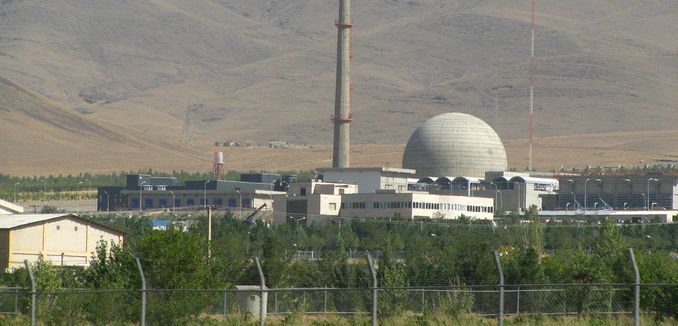The International Atomic Energy Agency’s latest report on Iranian compliance with the 2015 nuclear deal suggests “that Iran is not fully complying with the [agreement], or is at least pushing the envelope of compliance in a detrimental direction,” the influential Institute for Science and International Security charged in a report (.pdf) issued last week.
David Albright, the president of the institute, and Andrea Strickler, a senior policy analyst there, wrote that according to the IAEA’s February 24 report, Iran seems to have violated heavy water and enriched uranium limits imposed by the agreement, which is formally known as the Joint Comprehensive Plan of Action (JCPOA).
By a “reasonable interpretation of the JCPOA,” Iran is limited to “a total of 130 metric tonnes of heavy water whether the heavy water is in Iran or under its control outside Iran,” the authors noted. However, Iran currently has 124.2 metric tonnes of heavy water in country, and another 11 metric tonnes stored abroad.
Tehran may also be in violation of the deal’s limits on enriched uranium, the experts observed. While the IAEA report states that Iran’s total enriched uranium stockpile did not exceeded its 300 kilogram cap, “this value does not represent the total amount of uranium enriched up to 3.67 percent,” the authors noted. “If all the [low-enriched uranium] had been included, Iran’s stock would have exceeded the 300 kg cap,” they wrote.
Albright and Stricker also raised concerns that the IAEA report “does not discuss, and is cast in a way as to highly doubt, whether the inspectors have visited Iranian military sites.” This access is needed “to verify JCPOA bans on nuclear weaponization activities which could contribute to the development of a nuclear explosive device and develop confidence in the absence of undeclared nuclear material and activity as mandated under the IAEA comprehensive safeguards agreement and reinforced by the Additional Protocol,” they wrote.
They also cited allegations that Iran exploited the deal’s “quality assurance” criteria in order to conduct illicit mechanical testing of centrifuges.
Overall, Albright and Stricker wrote, “the IAEA effort in Iran needs to be strengthened, in particular by gaining access to Iranian military sites and providing more comprehensive reporting, and that strengthening should be fully supported by the Board of Governors and the P5+1.”
While promoting the nuclear deal, the Obama administration claimed that it cut off Iran’s four pathways to a nuclear weapon, thereby ensuring that Iran will temporarily have a breakout time–the time required to develop a nuclear weapon–of at least one year, enough time for the international community to respond. If Iran is allowed more nuclear material or faster centrifuges, its breakout time will be reduced.
The concerns raised by Albright and Stricker suggest that Iran is failing to fully comply with the terms of the deal, while the international community is failing to hold it to account.
The authors reported last September that Washington had granted Iran secret exemptions from some of its responsibilities under the nuclear deal, which Tehran would have otherwise failed to fulfill in time to receive nuclear-related sanctions relief.
Emily Landau, a proliferation expert at Israel’s Institute for National Security Studies, wrote on Monday that Iran’s violations stemmed from the Obama administration’s failure to pressure it to comply with the terms of the deal.
1) Rohani not moderate 2) for 18 mnths Obama did nothing in response 2Iran provocations -moderation? No: emboldened. https://t.co/vFQcm1UEYw
— Emily Landau (@EmilyBLandau) March 6, 2017
The need to rigorously enforce the nuclear deal was emphasized by both leading presidential contenders during the election campaign last year. Democratic candidate and former Secretary of State Hillary Clinton said in her speech to the American Israel Public Affairs Committee last March, “Our next president has to be able to hold together our global coalition and impose real consequences for even the smallest violations of this agreement.” Republican Donald Trump similarly said in his own speech to AIPAC, “we must enforce the terms of the previous deal to hold Iran totally accountable.”
[Photo: Nanking2012 / YouTube ]




